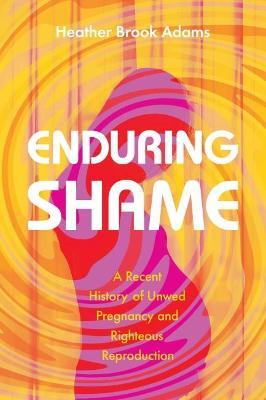Enduring Shame: A Recent History of Unwed Pregnancy and Righteous Reproduction

Enduring Shame: A Recent History of Unwed Pregnancy and Righteous Reproduction
A study of the rhetorical power of shame and its effect on reproductive politics
Not long ago, unmarried pregnant women in the United States hid in maternity homes and relinquished their illegitimate children to more deserving two-parent families--all to conceal shameful pregnancies. Although times have changed, reproductive politics remain fraught. In Enduring Shame Heather Brook Adams recasts the 1960s and '70s--an era of presumed progress--as a time when expanding reproductive rights were paralleled by communicative practices of shame that cultivated increasingly public interventions into unwed and teen pregnancy and new forms of injustice.
Drawing from personal interviews, archival documents, legal decisions, public policy, journalism, memoirs, and advocacy writing, Adams articulates how the rhetorical power of shame persuaded the American public to think about reproduction, sexual righteousness, and unwed pregnancy. Despite the aspirational goals of reproductive liberation, public sentiment frequently reflected supremacist beliefs regarding racial, economic, and moral fitness--notions that informed new public policy. Enduring Shame maps a range of experiences across these decades from women's experiences in homes for unwed mothers to policy and legal changes that are typically understood as proof of shame's dissipation, including Title IX legislation and Roe v. Wade. Rhetorical historiography and questions of reproductive justice guide the analysis, and women's testimonies provide essential perspectives and context. Through these histories, Adams articulates a network of language, affect, and embodiment through which shame moves; expands rhetorical understandings of the discursive power of the identities of woman and mother; and considers how the gendered, raced, and classed aspects of shame can help us understand and support reproductive dignity.
Enduring Shame recovers a misunderstood part of women's recent history by considering why reproductive politics continue to be so volatile despite previous gains and why shame still figures centrally in discourse about women's reproductive and sexual freedoms.
Descrierea produsului
A study of the rhetorical power of shame and its effect on reproductive politics
Not long ago, unmarried pregnant women in the United States hid in maternity homes and relinquished their illegitimate children to more deserving two-parent families--all to conceal shameful pregnancies. Although times have changed, reproductive politics remain fraught. In Enduring Shame Heather Brook Adams recasts the 1960s and '70s--an era of presumed progress--as a time when expanding reproductive rights were paralleled by communicative practices of shame that cultivated increasingly public interventions into unwed and teen pregnancy and new forms of injustice.
Drawing from personal interviews, archival documents, legal decisions, public policy, journalism, memoirs, and advocacy writing, Adams articulates how the rhetorical power of shame persuaded the American public to think about reproduction, sexual righteousness, and unwed pregnancy. Despite the aspirational goals of reproductive liberation, public sentiment frequently reflected supremacist beliefs regarding racial, economic, and moral fitness--notions that informed new public policy. Enduring Shame maps a range of experiences across these decades from women's experiences in homes for unwed mothers to policy and legal changes that are typically understood as proof of shame's dissipation, including Title IX legislation and Roe v. Wade. Rhetorical historiography and questions of reproductive justice guide the analysis, and women's testimonies provide essential perspectives and context. Through these histories, Adams articulates a network of language, affect, and embodiment through which shame moves; expands rhetorical understandings of the discursive power of the identities of woman and mother; and considers how the gendered, raced, and classed aspects of shame can help us understand and support reproductive dignity.
Enduring Shame recovers a misunderstood part of women's recent history by considering why reproductive politics continue to be so volatile despite previous gains and why shame still figures centrally in discourse about women's reproductive and sexual freedoms.
Detaliile produsului












